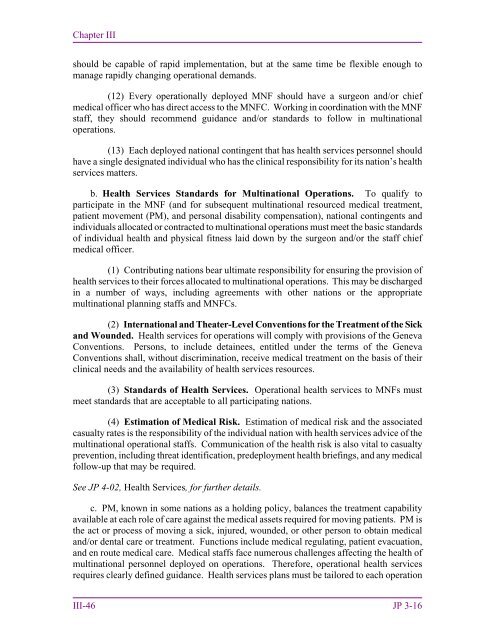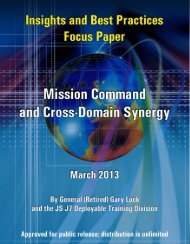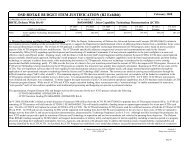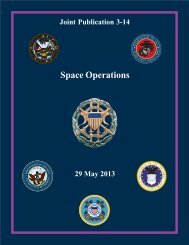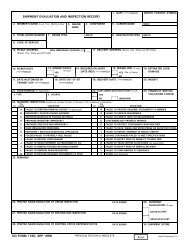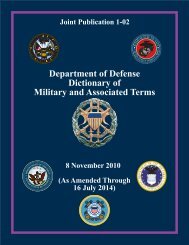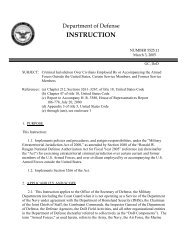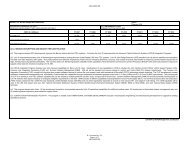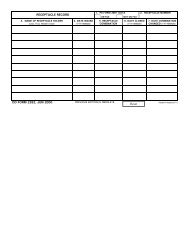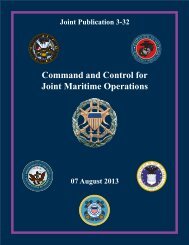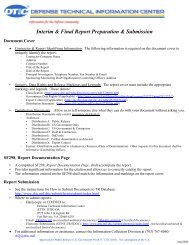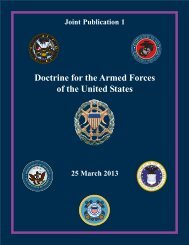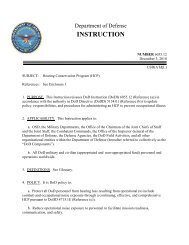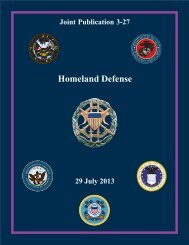JP 3-16, Multinational Operations - Defense Technical Information ...
JP 3-16, Multinational Operations - Defense Technical Information ...
JP 3-16, Multinational Operations - Defense Technical Information ...
You also want an ePaper? Increase the reach of your titles
YUMPU automatically turns print PDFs into web optimized ePapers that Google loves.
Chapter III<br />
should be capable of rapid implementation, but at the same time be flexible enough to<br />
manage rapidly changing operational demands.<br />
(12) Every operationally deployed MNF should have a surgeon and/or chief<br />
medical officer who has direct access to the MNFC. Working in coordination with the MNF<br />
staff, they should recommend guidance and/or standards to follow in multinational<br />
operations.<br />
(13) Each deployed national contingent that has health services personnel should<br />
have a single designated individual who has the clinical responsibility for its nation’s health<br />
services matters.<br />
b. Health Services Standards for <strong>Multinational</strong> <strong>Operations</strong>. To qualify to<br />
participate in the MNF (and for subsequent multinational resourced medical treatment,<br />
patient movement (PM), and personal disability compensation), national contingents and<br />
individuals allocated or contracted to multinational operations must meet the basic standards<br />
of individual health and physical fitness laid down by the surgeon and/or the staff chief<br />
medical officer.<br />
(1) Contributing nations bear ultimate responsibility for ensuring the provision of<br />
health services to their forces allocated to multinational operations. This may be discharged<br />
in a number of ways, including agreements with other nations or the appropriate<br />
multinational planning staffs and MNFCs.<br />
(2) International and Theater-Level Conventions for the Treatment of the Sick<br />
and Wounded. Health services for operations will comply with provisions of the Geneva<br />
Conventions. Persons, to include detainees, entitled under the terms of the Geneva<br />
Conventions shall, without discrimination, receive medical treatment on the basis of their<br />
clinical needs and the availability of health services resources.<br />
(3) Standards of Health Services. Operational health services to MNFs must<br />
meet standards that are acceptable to all participating nations.<br />
(4) Estimation of Medical Risk. Estimation of medical risk and the associated<br />
casualty rates is the responsibility of the individual nation with health services advice of the<br />
multinational operational staffs. Communication of the health risk is also vital to casualty<br />
prevention, including threat identification, predeployment health briefings, and any medical<br />
follow-up that may be required.<br />
See <strong>JP</strong> 4-02, Health Services, for further details.<br />
c. PM, known in some nations as a holding policy, balances the treatment capability<br />
available at each role of care against the medical assets required for moving patients. PM is<br />
the act or process of moving a sick, injured, wounded, or other person to obtain medical<br />
and/or dental care or treatment. Functions include medical regulating, patient evacuation,<br />
and en route medical care. Medical staffs face numerous challenges affecting the health of<br />
multinational personnel deployed on operations. Therefore, operational health services<br />
requires clearly defined guidance. Health services plans must be tailored to each operation<br />
III-46 <strong>JP</strong> 3-<strong>16</strong>


